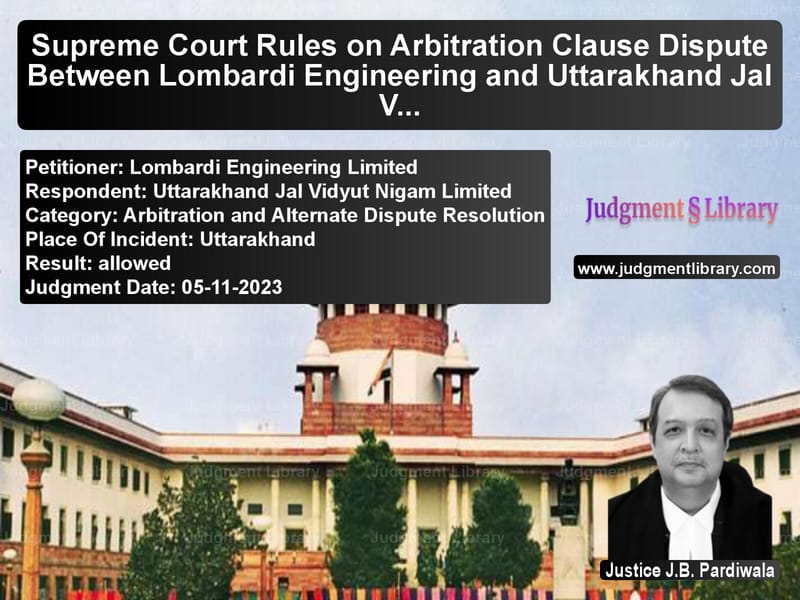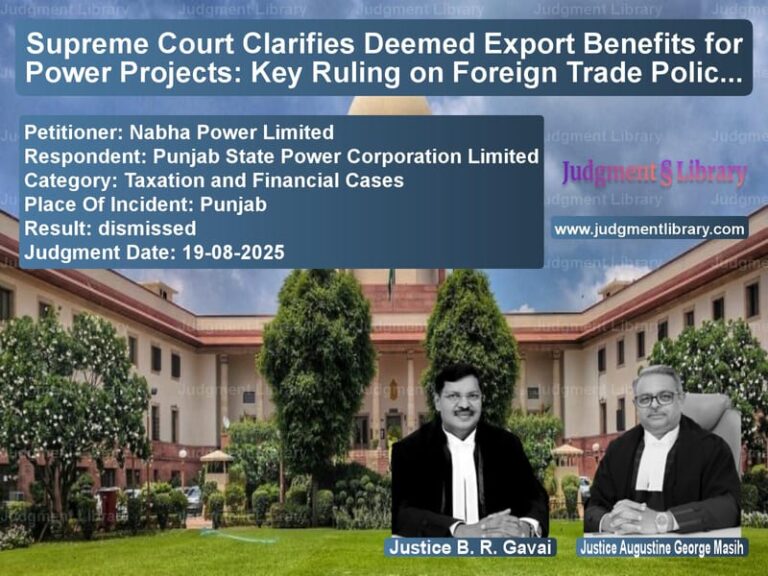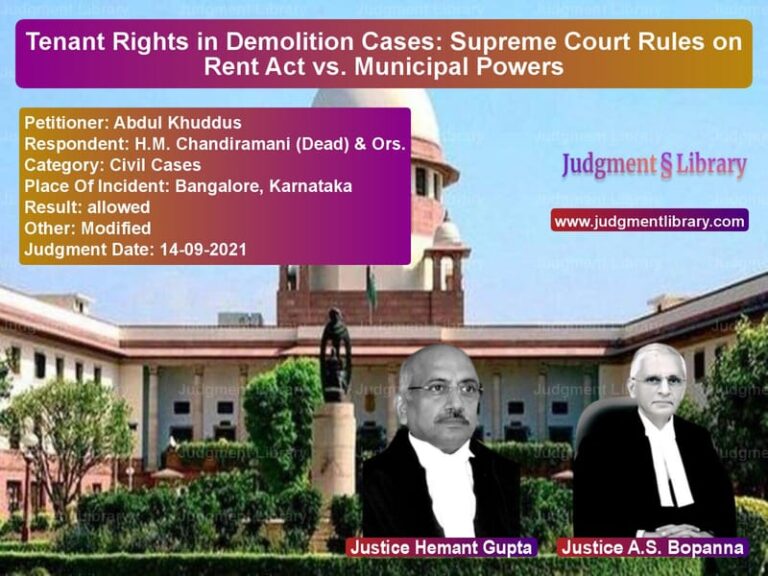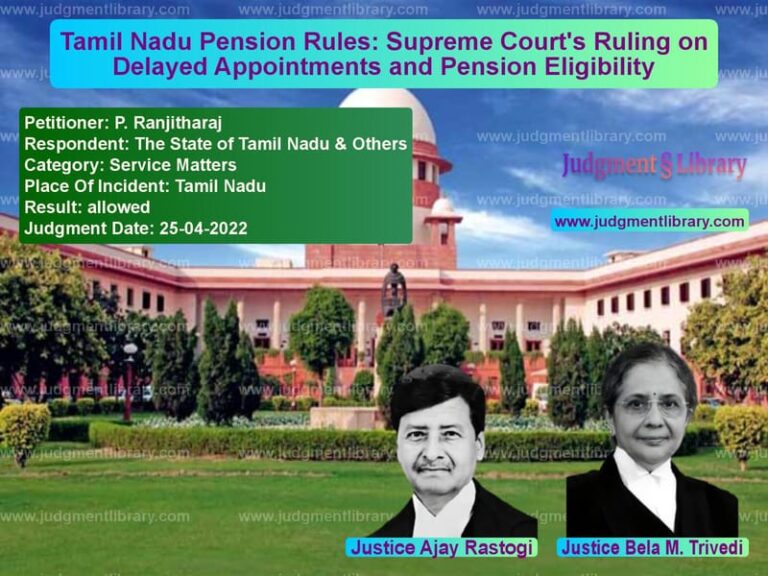Supreme Court Rules on Arbitration Clause Dispute Between Lombardi Engineering and Uttarakhand Jal Vidyut Nigam
The Supreme Court of India recently adjudicated on a crucial arbitration dispute in Lombardi Engineering Limited v. Uttarakhand Jal Vidyut Nigam Limited, where a Swiss-based design consultancy firm sought the appointment of an arbitrator for resolving disputes arising from a contract entered with Uttarakhand Jal Vidyut Nigam Limited (UJVNL). The judgment is a landmark in arbitration jurisprudence, especially regarding pre-deposit clauses and unilateral appointment of arbitrators.
Background of the Case
The petitioner, Lombardi Engineering Limited, is a Swiss-based consultancy firm specializing in design consultancy. The respondent, Uttarakhand Jal Vidyut Nigam Limited (UJVNL), is a government-owned corporation operating hydropower plants in Uttarakhand. The dispute stems from a contract dated October 25, 2019, for consultancy services related to the Arakot Tiuni Hydro Electric Project on the Pabar River in Uttarkashi.
The project was initially awarded to the Uttarakhand Project Development and Construction Corporation Limited (UPDCC). However, by an order dated May 8, 2020, the Uttarakhand government transferred the project from UPDCC to UJVNL via a tripartite agreement dated October 6, 2020. As per the agreement, UJVNL assumed all obligations under the contract.
Dispute and Invocation of Arbitration
The dispute arose when UJVNL failed to clear outstanding payments totaling ₹1,04,32,664.86 to Lombardi Engineering. The petitioner issued a notice of arbitration on May 6, 2022, invoking Clause 55 of the contract and proposing a sole arbitrator.
Instead of responding to the arbitration notice, UJVNL terminated the contract on May 9, 2022, citing non-compliance with work obligations. Aggrieved, Lombardi Engineering filed an application under Section 11(6) of the Arbitration and Conciliation Act, 1996, seeking the appointment of an independent arbitrator.
Petitioner’s Arguments
The petitioner, through its counsel, raised the following key arguments:
- The case qualifies as an international commercial arbitration since the petitioner is incorporated outside India, and hence, the Supreme Court has jurisdiction under Section 11(12)(a) of the Arbitration Act.
- Clause 55(b)(I) of the contract, which allows the Principal Secretary (Irrigation), Government of Uttarakhand, to unilaterally appoint the arbitrator, is void under the ruling in Perkins Eastman Architects DPC v. HSCC (India) Limited.
- The requirement of 7% pre-deposit before initiating arbitration is arbitrary and violates Article 14 of the Constitution, as established in ICOMM Tele Limited v. Punjab State Water Supply and Sewerage Board.
- The unilateral appointment of an arbitrator by the state authority is against the principles of neutrality and independence mandated under Section 12(5) of the Arbitration Act.
Respondent’s Arguments
The respondent, UJVNL, opposed the petition, arguing:
- The petitioner had failed to meet two preconditions for invoking arbitration: (i) depositing 7% of the claim amount as security and (ii) approaching the Principal Secretary for appointing an arbitrator.
- The pre-deposit clause serves as a deterrent against frivolous claims and was upheld in S.K. Jain v. State of Haryana.
- The arbitration clause is valid and binding as per the contract.
Supreme Court’s Analysis
1. Pre-Deposit Clause
The Court examined whether the 7% pre-deposit condition was enforceable. It referred to the judgment in ICOMM Tele Limited, which struck down a similar pre-deposit requirement as unconstitutional under Article 14. The Court held:
Read also: https://judgmentlibrary.com/supreme-court-rules-on-loss-of-profit-claims-in-arbitration-disputes/
“The pre-deposit condition in Clause 55 is arbitrary as it lacks a mechanism for refund and serves no legitimate purpose. Arbitration should not be financially burdensome for the weaker party.”
2. Unilateral Appointment of Arbitrator
The Court reaffirmed its stance in Perkins Eastman, holding that an arbitration clause allowing one party (here, the state entity) to appoint an arbitrator is invalid under Section 12(5). The judgment noted:
“The unilateral appointment of an arbitrator by the Principal Secretary of the respondent organization creates a conflict of interest and violates the principles of neutrality.”
3. Applicability of Section 11(6)
The Court held that under Section 11(6), it has jurisdiction to appoint an independent arbitrator when the agreed arbitration mechanism is contrary to law. The ruling stated:
“In cases where the arbitration agreement is in conflict with statutory provisions or fundamental rights, the Court has the power to appoint an independent arbitrator under Section 11(6).”
4. Validity of Pre-Arbitration Conditions
The Court emphasized that conditions restricting access to arbitration must be reasonable. It cited Uber Technologies Inc. v. Heller, where a Canadian court struck down an arbitration clause requiring exorbitant fees as a condition for dispute resolution. The Supreme Court of India observed:
“Any condition that makes arbitration practically unattainable is violative of fundamental fairness and must be struck down.”
Final Judgment
After considering all arguments, the Supreme Court ruled:
- The 7% pre-deposit condition under Clause 55 is unconstitutional and unenforceable.
- The unilateral appointment of an arbitrator by the Principal Secretary (Irrigation) is void under Section 12(5) of the Arbitration Act.
- The Court appointed an independent arbitrator, Mr. V.K. Bist, former Chief Justice of the High Court of Sikkim, to resolve the dispute.
- The fees and modalities of arbitration would be determined in consultation with both parties.
This judgment reinforces the need for neutrality in arbitration proceedings and prevents financially restrictive conditions that obstruct access to justice. By striking down arbitrary preconditions, the Supreme Court has strengthened India’s arbitration framework in line with global best practices.
Petitioner Name: Lombardi Engineering Limited.Respondent Name: Uttarakhand Jal Vidyut Nigam Limited.Judgment By: Justice J.B. Pardiwala.Place Of Incident: Uttarakhand.Judgment Date: 05-11-2023.
Don’t miss out on the full details! Download the complete judgment in PDF format below and gain valuable insights instantly!
Download Judgment: lombardi-engineering-vs-uttarakhand-jal-vidy-supreme-court-of-india-judgment-dated-05-11-2023.pdf
Directly Download Judgment: Directly download this Judgment
See all petitions in Arbitration Awards
See all petitions in Dispute Resolution Mechanisms
See all petitions in Enforcement of Awards
See all petitions in Institutional Arbitration
See all petitions in Commercial Arbitration
See all petitions in Judgment by J.B. Pardiwala
See all petitions in allowed
See all petitions in supreme court of India judgments November 2023
See all petitions in 2023 judgments
See all posts in Arbitration and Alternate Dispute Resolution Category
See all allowed petitions in Arbitration and Alternate Dispute Resolution Category
See all Dismissed petitions in Arbitration and Alternate Dispute Resolution Category
See all partially allowed petitions in Arbitration and Alternate Dispute Resolution Category







